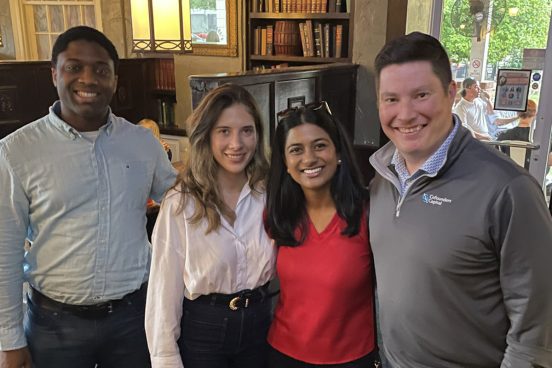Duke Daytime MBA Student Blog

The Highs and Lows of Entrepreneurship During Business School
When I came into my first year at Fuqua, second year of my dual-degree overall, I had decided it was time to embrace something different. Fresh off an internship at WeWork, I had entrepreneurial inspiration and an idea for applying techniques I learned during my internship to a new context.

When I came into my first year at Fuqua, second year of my dual-degree overall, I had decided it was time to embrace something different. Fresh off an internship at WeWork, I had entrepreneurial inspiration and an idea for applying techniques I learned during my internship to a new context. I wanted to develop a technology to address an educational gap I dubbed a lack of “carbon literacy.” Similar to the concept of financial literacy, carbon literacy is an understanding of the carbon impact of our consumption habits and how we can properly manage that impact.
It was this foundation on which the idea for carbIN (Carbon Insights) was born. My co-founders and I found that personal carbon accounting was overly burdensome, and believed this, among other influences, was contributing to the paralysis that consumers feel over selecting more sustainable options. While we might read an article on sustainable living every once in a while, it isn’t long before the learnings we glean from that article fade and fail to actually alter our consumption habits. We determined we needed a solution that was dynamic and low effort in order to help develop the ‘language of carbon’ among the masses. While existing solutions were aiming for this same target, their approaches seemed to appear short. Our conversations led us to understand that few people wanted another niche app on their phone and most companies aren’t invested in developing this type of feature for their consumers.
With our background research in hand, we set out to develop our minimum viable product (MVP) and secure a pilot. In July of 2020 we completed our MVP and our application programming interfaces (API), which calculates the carbon, land use, and water use impact of any categorized transaction sent our way. At the beginning of September, we found out that we were accepted to Cohort 7 of the Joules Accelerator, a Charlotte-based accelerator focused on climate tech and grid tech companies with net zero carbon emissions. Through this accelerator, my team and I will get to work alongside climate and commercialization experts at organizations such as Microsoft, Bank of America, Wells Fargo, EY, and more.

Once my unbounded excitement about carbIN’s acceptance to Joules had settled, I had the opportunity to reflect on how far we’d come from early ideation last summer. One of the things that stood out to me most was how the endless support of my network throughout this endeavor. Whether it was from the EDF Climate Corps network, or grants from Duke, or most notably, the support of the Center for Entrepreneurship and Innovation (CEI) at Fuqua, the way that my network showed up was amazing. I can’t keep track of the number of times Stephen Fusi, managing director of CEI, was willing to meet with me about this idea. Moreover, Professor Jamie N. Jones, executive director of CEI, and Stephen have offered constant support in product testing opportunities, connections to student founders programs, and so much more.
I’ll admit I haven’t been the perfect entrepreneurial student here at Fuqua. I have not yet enrolled in either of the New Ventures courses, despite the raving reviews (oops), and I was too late to apply to the Student Founders program last year when I originally learned about it. I didn’t attend the Entrepreneurship Bootcamp during my orientation because I was still working at my internship and I am not on the cabinet of the Entrepreneurship and Venture Capital Club leadership. Still, despite my ‘delinquency’ in embracing the entrepreneurial track here at Fuqua, the entrepreneurship community has wholeheartedly embraced me. The clearest demonstration of this was when I was invited to pitch to the CEI board among several other groups of students, who had all come together through New Ventures pathways.
All in all, my learnings so far are as follows: the highs and lows of entrepreneurship are real, very real. Being in an MBA program, I thought that I could always have other options, so what did I really have to lose during my time at Fuqua? I failed to fully anticipate the complete emotional rollercoaster it would be to build something from nothing and am so grateful for the incredible support of the CEI and Team Fuqua overall. The abundance of entrepreneurial opportunities available at Fuqua is still incredible to me, from New Ventures to mentored studies, to pitch events and more. Without a doubt, I encourage all prospective students (and current) to consider the opportunities in entrepreneurship that lie at Fuqua and to embrace these chances whenever they pop up. Even if you aren’t what you consider the perfect image of an entrepreneur (I’m imagining some San Francisco street style, Allbirds included), there’s a pathway for you at Fuqua to test out your ideas and take them to the next level.
This originally appeared on CEI’s blog on October 22, 2020



